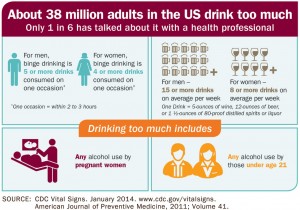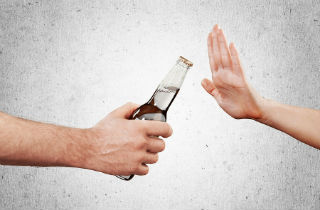ARTICLE OVERVIEW: Alcohol can cause changes to the brain. It can literally alter decision making, judgment, and control. This article offers tips that can help you quit alcohol safely and effectively.
ESTIMATED READING TIME: 10-15 minutes.
TABLE OF CONTENTS:
- Drinking Problem or Not?
- Main Signs
- Is Alcohol Addiction Normal?
- What the Experts Say
- How to Quit
- Where to Get Help
- Your Questions
Drinking Problem or Not?
Do you have a few occasional drinks? If so, you are among half of all adult Americans who do. In fact, the 2015 NSDUH reported that 56% of all people aged 18+ were current drinkers, and drank alcohol in the past month.
But are you one of the 15 million people who can be diagnosed with a drinking problem?
Some people may develop alcohol habit after occasional drinking, which can lead to having drinking problems. Others may binge drink when out partying. Still other drinkers end up with a problem after years of chronic drinking. So, technically, when do you have a drinking problem?
The National Institute on Alcohol Abuse and Alcoholism reports that you have a drinking problem if:
For women:
- You drink more than 1 drink per day.
- You drink more than 7 drinks per day.
- You drink more than 3 drinks on any single day.
For men:
- You drink more than 2 drinks per day.
- You drink more than 14 drinks per week.
- You drink more than 4 drinks on any single day.
Do you fit into this profile?
If yes, would you be willing to do something about your drinking problem? Here, we review the common signs of problem drinking, and offer you hope for getting rid of alcohol once and for all. If you have any additional questions, please leave them at the end, and we’ll try to respond personally and as soon as possible.
Check out this Utah State Public Health Indicator for problem drinking image for more stats:

Signs
An alcohol abuse disorder is a serious and progressive condition. But, the good news is that it is treatable! And, you are not alone.
The 2016 SAMSHA annual report on drug use and health found that 15.1 million people aged 12 or older could be diagnosed with an alcohol use disorder in 2016. This means that 1 in 18 Americans have a drinking problem. Moreover, this report shows that 21 million people aged 12 or older are in need of rehab for alcohol and/or drug use…
In order to get rid of alcohol for good, you need to learn as much as you can about the disease and ask for professional medical help from a doctor, an addiction counselor, or other mental health professionals (a psychotherapist, a psychiatrist, or a licensed clinical social worker). Since alcohol addiction is a disorder like all other substance abuse disorders it shares the same characteristics. Signs and symptoms of alcohol abuse include:
- Acting secretly, lying and hiding about drinking.
- Changes in physical appearance, such as lack of personal hygiene.
- Continued drinking despite negative consequences.
- Experiencing alcohol withdrawal symptoms whenever you try to stop.
- Lost control over drinking.
- Low performance at work or school due to drinking.
- Neglecting important activities such as spending time with family and friends, pursuing hobbies or other interests… because of alcohol.
- Relationship issues with family, friends and loved ones because of rapid changes in behavior.
How many criteria did you check?
If you’e noticed even one of these consequesces, ask help from a licensed addiction specialist.
Still not sure? Check out these online screening tools and questionnaires:
Is Alcohol Addiction Normal?
Yes, and no!
Alcoholism is a predictabe process that occurs in individuals who drink too much and too often. But at the same time, drinking is not a normal way to deal with problems, traumas, and stressors in life. In fact alcohol addiction comes as a result of long term alcohol abuse which evolves as dependence and eventually leads to addiction.
Plus, drinking can bring on many health problems. According to the Substance Abuse and Mental Health Administration, SAMHSA, excessive alcohol use, including underage drinking and binge drinking, can increase a person’s risk of developing serious health problems. Alcohol abuse causes serious health problems such as:
- Brain damage
- Fetal damage in pregnant women
- Heart disease
- Hypertension
- Liver damage.
As alcohol use and abuse affects so many Americans, studies are showing that addiction can affect the lives of anyone, despite age, gender, religion and race. Sadly, as reported by the Monitoring the Future Survey (MFT), it is teenagers and adolescents continue to develop alcohol problems. In addition to this, alcohol is by far the most widely used psychoactive drug in the United States.
People have access to alcohol almost everywhere and they drink it for so many various reasons such as:
- Socializing
- Celebrating
- Relaxing
Still, alcohol is the third leading cause of preventable death in the U.S. According to published records from the Centers for Disease Control and Prevention (CDC), alcohol use causes 88,000 deaths a year! Also, the CDC reported that 6 people die every day from alcohol poisoning, and most of them are among adults aged from 35 to 64.
Moreover, the 2016 National Survey on Drug Abuse and Health found out that about 136.7 million Americans aged 12 or older are current users of alcohol (65.3 million binge users, and 16.3 million heavy alcohol users). This huge number is break down into age category:
- 2.3 million adolescents aged 12 to 17 are current alcohol users.
- 19.8 million young adults aged 18 to 25 are current alcohol users.
- 114.7 million adults aged 26 or older are current alcohol users.
Every day these numbers affect men, women, and children… Are you ready make a difference? Are you ready to cut down on your drinking?
What The Experts Say
Experts encourage people to lower drinking through education. Mainly, the message is that alcohol affects the brain. And the idea is to plan drinking BEFORE you go out.
In another example, Addiction Blog contributor, Dr. Harold C. Urschel says: “It’s important to understand that alcohol addiction causes the brain to form deep physical and emotional connections between the substance and the user’s sense of pleasure. These connections make it extremely difficult for those addicted to alcohol to resist the urge to drink, meaning the brain will need at least one year to “reset” itself.”
To learn more about the nature of alcohol problems and handling alcohol addiction you might want to check out some of the following books:
- Sober for Good, by Anne Fletcher.
- I’ll Quit Tomorrow, by Vernon Johnson.
- Believable Hope, by Michael Cartwright.
How to Quit
Alcohol drinking problems concern many individuals. If you have developed an addiction to alcohol, it’s probably best to ask for professional help due to the seriousness of this matter. But, here are a few suggestions that you may find useful along the way to alcohol recovery.
1. Make permanent changes in your life.
Leaving your drinking behind does not only mean quitting the booze, but creating a new life that includes healthy habits that don’t support alcohol any longer. Alcohol abuse is only the result of a deeper dissatisfaction from your life.
So, in order to replace drinking you need to find other alternative activities to transform any destructive energy you might have in the future. In has been scientifically proven that sport activities are very beneficial for people who are frequently exposed to stress. Find an activity / activities that make you happy and fulfilled. Do not let drinking alcohol to be your escape plan!
Another important part of your recovery journey should be changing the way you respond to stressors. So, take the time and work on your thoughts and emotional processes that can help you regain self-control. Techniques such as mindfulness and meditation can be an extremely beneficial part of your alcohol recovery.
2. Honesty should become a part of your character.
Addiction is often characterized through lies, but recovery requires honesty! Start with being honest and true to yourself and then to everyone around you. Support groups such as A.A. meetings m, SMART Recovery, or S.O.S. Sobriety ight help you open up and share your burdens and experiences with alcohol. People find it easier to relate to others who’ve had similar addiction experiences.
3. Reach out for help.
Alcoholism is a complex disorder which requires medical care and management. The high rate of relapses among those who try to manage this problem by themselves only confirms the need for support.
Recovery is a long-term process and requires devotion and strong will. Look for the right treatment program for you. Use SAMHSA’s treatment locator to search for for treatment centers that fit your needs and explore all your options carefully.
4. Stick to your treatment plan.
You have probably heard by now that “there are no shortcuts to happiness”. Similarly, there are no a shortcuts to recovery.
A medical treatment plan for deep-seated or long-term problems is developed to best suit your needs. Recovery won’t just happen if you don’t obey the rules of your treatment plan. As they say: “It works if you work it!” So make sure to give your 100% attention during treatment and later in your continued recovery! In the end, you are going through recovery for your own wellbeing, so that should be a reason enough for you to feel motivated.
Where To Get Help
Struggling with drinking problem can ruin your life. Get your facts and signs straight, and admit that you have a problem. Don’t waste your time, seek help from professionals including:
- Addiction rehabs.
- Certified addiction specialist.
- Licensed psychologists
- Licensed psychiatrists
- Medical detox clinics
- Medical doctors
Your Questions
If you still have questions about quitting drinking once and for all, feel free to post them in the comments section below. We try to respond to all legitimate questions personally and promptly. Also, you you know more tips on quitting alcohol, please share them with us.









Related Posts